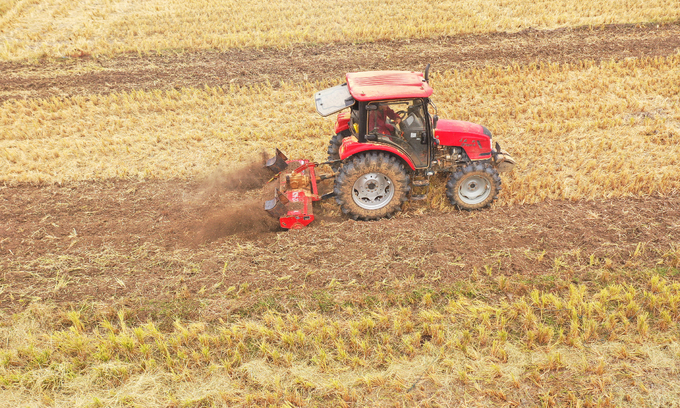November 28, 2025 | 03:11 GMT +7
November 28, 2025 | 03:11 GMT +7
Hotline: 0913.378.918
November 28, 2025 | 03:11 GMT +7
Hotline: 0913.378.918
have affected the agriculture and husbandry sector in some areas, including North China's Inner Mongolia Autonomous Region and Northwest China's Xinjiang Uygur Autonomous Region.

A farmer operates a tractor to plough and prepare for sowing winter grain in Taihe county, East China's Jiangxi Province on October 27, 2022. Photo: VCG
Industry insiders and experts said that the overall impact on grain crops is limited so far, and the output of winter wheat is expected to continuously increase due to the snow.
To minimize losses, relevant central and local government agencies are issuing guidance and taking measures to help farmers cope with the frost and freezing conditions.
The Ministry of Agriculture and Rural Affairs (MOA) suggested that farmers and herdsmen reinforce barns and sheds to ensure warmth for livestock, increase their stockpiles of animal feed and pay attention to animal epidemic prevention to prepare for the cold weather, according to a statement on its website on Wednesday.
The local authorities in Central China's Henan Province also issued guidance on wheat, vegetable, seafood and livestock production amid extreme cold weather.
Fuyun county in Altay, Xinjiang held a meeting on Wednesday, analyzing the difficulties farmers face amid the extreme cold and heavy snow, and asking those involved to follow the whole process of livestock transfer and ensure safe transportation, local media reports said.
In Altay, some cattle and sheep wandered away or were covered under the heavy snow several days ago, but they have been found, domestic news site Jiemian News reported on Thursday, citing local officials.
An Inner Mongolia-based agricultural company that engages in trading local beef and mutton told the Global Times on Thursday that the cold waves so far have had a slight impact on local animal husbandry.
"We prepared feed and heating facilities in advance, and reduced the time and frequency of herding activities," an employee of the company said. She said that the weather did not have a great impact on road traffic so far, and the transport of animal feed and meat shipments remains normal, meaning products are able to reach major cities within three days.
"The impact of the latest round of cold waves is only limited to outdoor vegetables and husbandry in certain regions, while winter wheat as well as greenhouse vegetables are unlikely to be affected," Li Guoxiang, a research fellow at the Rural Development Institute of the Chinese Academy of Social Sciences, told the Global Times on Thursday.
As the autumn and winter grain sowing season is drawing to a close, China has completed 99 percent of winter wheat and oilseed rape planting across the nation, laying a solid foundation for the harvest in 2023, latest data from the MOA showed.
"In order to guarantee grain security, arable land should be strictly protected, which is the basic foundation for grain production," Li said, while also pointing to technologies to enhance agricultural mechanization, nurture seeds with resistance to natural disasters, and continuously promote the development of agricultural water conservation and high-standard farmland.
Despite frequent extreme weather and the COVID-19 pandemic in recent years, China has managed to maintain a steady increase in grain production, with output stabilizing at over 1.3 trillion jin (650 million tons) for seven consecutive years, according to data from the National Bureau of Statistics.
(Global Times)

(VAN) A new study reveals how the simultaneous effects of ocean acidification, salinity and loss of oxygen are making the world more fragile.

(VAN) Hopes are growing that the creation of the first 3D turkey gut model could be a turning point in the battle against the virulent blackhead disease.

(VAN) Tyson, America’s biggest meat supplier, plans to shutter one of its largest beef processing plants as the industry continues to struggle with low cattle supplies and political pressure from Washington.

(VAN) New FAO study shows how digital solutions are empowering farmers and fishers to prevent losses and build resilient agrifood systems.

(VAN) Brazil's COP30 presidency pushed through a compromise climate deal on Saturday that would boost finance for poor nations coping with global warming but that omitted any mention of the fossil fuels driving it.

(VAN) Poultry farmers in the UK have been warned that they could face one of the worst winters yet for bird flu.

(VAN) Prices of main-crop paddy have risen sharply, with jasmine rice hitting 16,100 baht per tonne — the highest level in years.